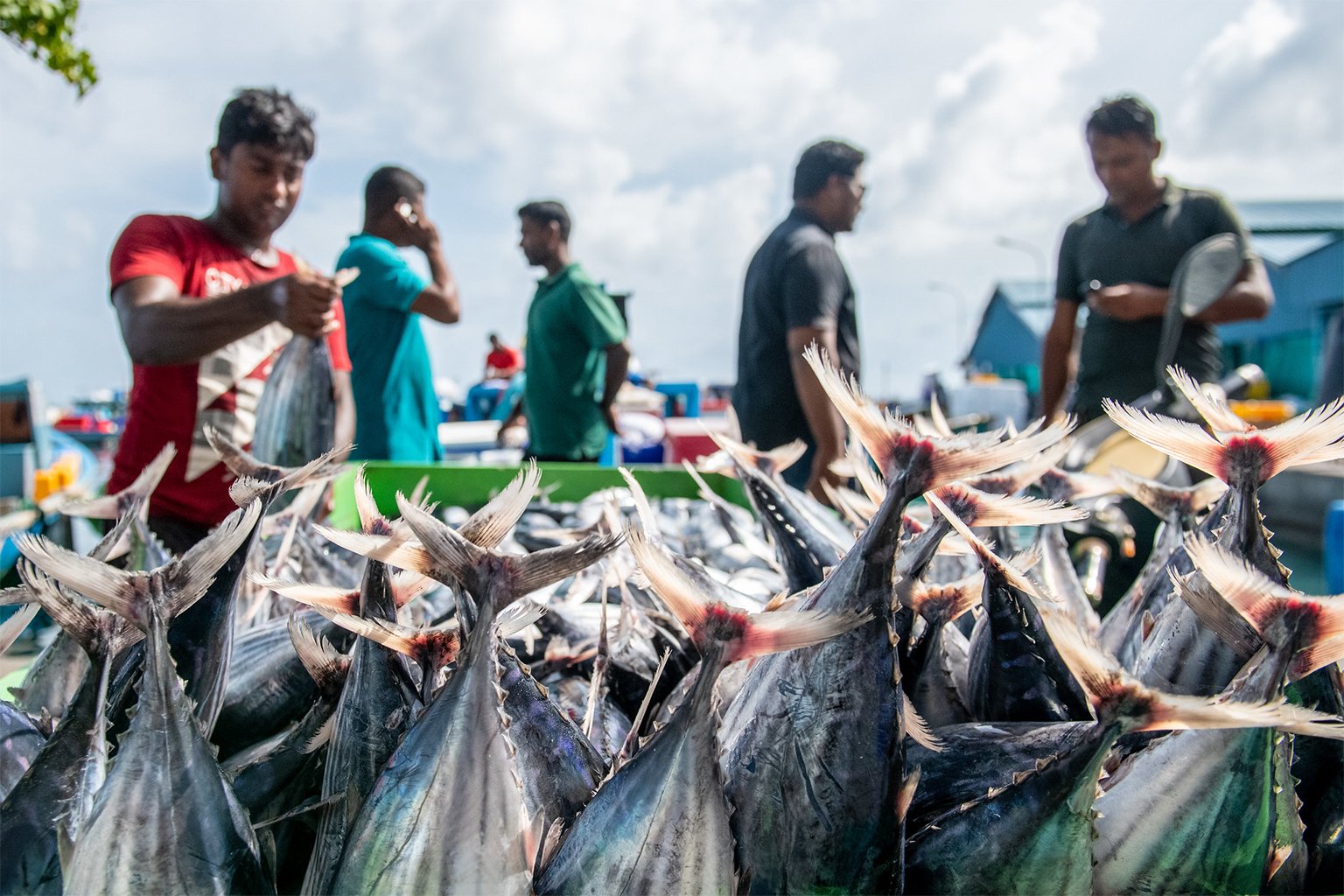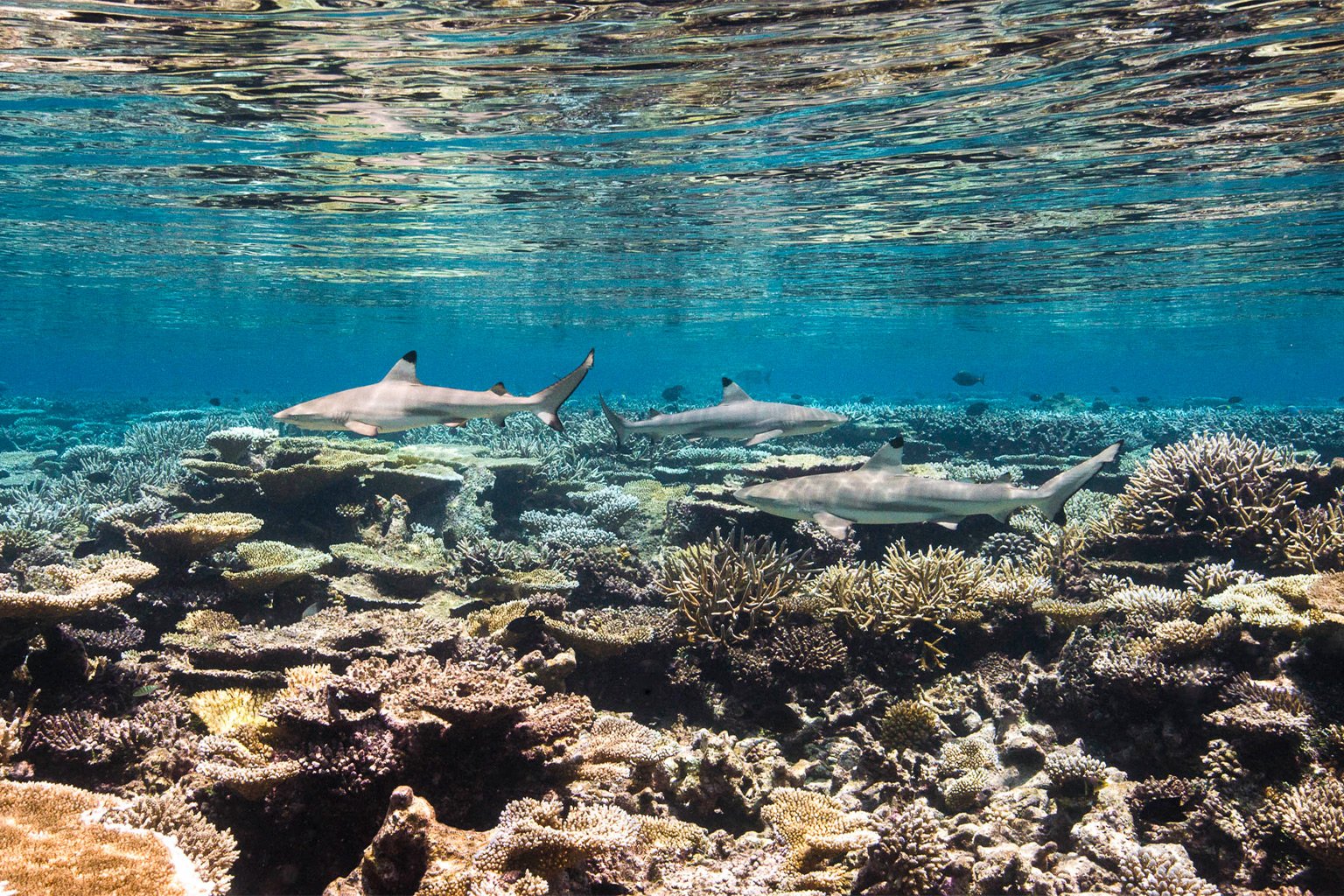- A 2010 blanket ban on shark fishing in the Maldives doesn’t enjoy support from artisanal reef fishers, a new study suggests.
- Many fishers blamed sharks for stealing their catches, eating into their earnings, and damaging their fishing equipment — problems they perceive have worsened since the creation of a shark sanctuary.
- These negative perceptions could result in lower compliance with fishing restrictions and undermine efforts to revive shark populations in Maldivian waters.
- Pole-and-line skipjack tuna fishers reported the greatest support for the shark fishing ban because sharks corral tuna to the ocean surface, making them easier to catch.
In 2021, faced with an economy battered by the COVID-19 pandemic, the island nation of Maldives considered lifting a ban on shark fishing that had been in place since 2010. A global outcry followed, and the government quickly abandoned the idea.
The 2010 ban effectively turned Maldivian waters, a marine area the size of Portugal, into a shark sanctuary, the first of its kind in the Indian Ocean.
But whether it remains that way is far from certain, a new paper in Conservation Letters shows. Discontent is festering among both small-scale fishers and commercial tuna fishers, with fishers blaming sharks for stealing their catches, eating into their earnings, and damaging their fishing gear. This threatens what conservationists see as a successful intervention to slow this iconic fish’s decline.
“There was quite a lot of anger and resentment towards sharks,” Danielle Robinson, a marine conservationist at Newcastle University, U.K., who led the research, told Mongabay. Many fishers blamed the creation of the shark sanctuary for a worsening of the problems.
While there’s no authoritative data showing that sharks are now more abundant in Maldivian waters, that doesn’t mean we should ignore the disaffection among local communities, Robinson said.
“In human-wildlife conflicts, people often focus on collecting data, for example, whether sharks have increased or depredation has increased,” she said. “But what we need to understand is human perception.”
Sharks in the Maldives do appear to have a public relations problem. Fishermen who see them as detrimental to their livelihoods are less inclined to support shark conservation measures, interviews with about 100 fishers revealed.
Reef fishers vs. sharks
The Maldives comprises more than 1,000 islands scattered in a swath of ocean spanning 90,000 square kilometers (35,000 square miles). It’s home to at least 30 shark species, including the endangered whale shark (Rhincodon typus), the world’s biggest fish, and at least a dozen varieties of reef sharks. It’s one of only 17 shark sanctuaries in the world.
Almost a quarter of all shark species, numbering more than 500, are at threat of extinction. As elsewhere around the world, targeting of sharks for their fins and their capture as bycatch in other fisheries led to declines in shark numbers in Maldivian waters.
The study suggests that reef fishers who target fish living on coral reefs are especially unhappy with shark protections. Reef fishers said more than a fifth of their daily earnings are lost to shark run-ins. “If you think about it, sharks and fishers are after the same thing. They both want fish,” Robinson said.
The abundance of marine life in coral neighborhoods attracts both humans and bigger fish like sharks. That makes it inevitable that sharks will feed on a fisher’s catch, partly or fully, before it can be reeled aboard, in an act known as depredation. Almost three-quarters of the 84 fishers surveyed reported higher depredation rates in the last five to 10 years.
This dissatisfaction has real consequences. Nearly one in 10 reef fishers said they killed sharks that came after their catch. Some described throwing the carcass overboard as a warning to other sharks.
However, small fishers don’t usually resort to retaliatory killing of sharks, in part because it’s dangerous to try to reel in a shark on a small vessel. (They would need a bigger boat.) An overwhelming majority of reef fishers said they moved to other fishing grounds to avoid sharks.
Robinson said the results of the study aren’t an indicator that shark populations are rising. Unpublished data collected between 2016 and 2020 indicate that shark numbers are stable.

Shark populations tend to recover slowly because they reach sexual maturity late and generally produce few offspring after long pregnancies (the average gestation period is 14 months).
Fishers and sharks could be coming into frequent contact because of other reasons. A study from Australia suggests sharks are drawn to the presence of fishers, taking them to signal food availability.
The Maldives’ shark-fishing ban emerged from concerns about falling shark numbers in the country’s waters, especially those of reef sharks. These fish were coveted both by fishers and dive operators who pull in millions of dollars in revenue for the Maldivian economy. After fisheries, tourism is the biggest income generator for the country.
One major reason for putting in place a blanket ban on shark fishing was “the importance of shark-related dive tourism to the Maldives,”said Adam Ziyad, director-general of fisheries at the Ministry of Fisheries, Marine Resources and Agriculture.
‘Having local support is critical’
Conservationists seeking political support often make the case that sharks are worth more “alive than dead.” Scientists have successfully put a dollar value on the presence of sharks. However, such estimates don’t necessarily reveal who is paying the cost and who is reaping the benefits.
Robinson said reef fishers’ adverse views of sharks could stem from their marginalization when it comes to consultations on conservation actions. The focus has always been on the commercial and economically valuable tuna fishery, even when the reef-fishing communities suffer the most from fishing restrictions.
The new research found that fishing communities don’t speak in one voice when it comes to shark conservation. The team surveyed three kinds of fishers: reef fishers, pole-and-line fishers, who mostly target skipjack tuna (Katsuwonus pelamis) in open seas, and handline fishers, who target pelagic yellowfin tuna (Thunnus albacares).
Tuna is the country’s biggest export. Maldivian fishers bring home almost 100,000 metric tons of tuna every year, most of it skipjack or yellowfin.


Reef fishers and handline fishers who target yellowfin tuna were most likely to report depredation by sharks. Reef fishers had frequent run-ins with gray reef sharks (Carcharhinus amblyrhynchos), whitetip reef sharks (Triaenodon obesus), and blacktip reef sharks (Carcharhinus melanopterus).
Unlike reef fishers, skipjack tuna fishers using pole and line were largely in favor of protections because healthy shark populations helped them locate tuna schools on the open ocean. This isn’t the case with those who target yellowfin.
Yellowfin tuna fishers who rely on handlines were divided in their support for shark protections. They reported low rates of depredation (around 7%) but did not perceive any significant benefits from greater shark abundance.
Yet, Ziyad, at the fisheries ministry, cited the impact of sharks on tuna fishing to explain what prompted a review of the shark-fishing ban.
“There is a lot of pressure on the government and the ministry to review the shark ban and sanctuary designation as depredation is having a major impact on the income of fishers, especially handline fishers that target large yellowfin,” he said.
The fear is that a lack of support from small-scale fishers will translate into poor compliance with regulations, Robinson said. This is especially true in the Maldives. The country comprises about 1% land and 99% water, making monitoring compliance challenging.
“Having that local support is critical if we want conservation to be successful,” Robinson said, adding that this could be done by engaging with all fishing groups and providing alternative livelihood opportunities where necessary.
Banner image: A blacktip reef shark swims among smaller fish in the Maldives. Image by Peter Smithson via Flickr (CC BY-NC-SA 2.0).
Citations:
Robinson, D., Newman, S. P., Whittingham, M. J., Francksen, R. M., Adam, M. S., & Stead, S. M. (2022). Fisher-shark interactions: A loss of support for the Maldives shark sanctuary from reef fishers whose livelihoods are affected by shark depredation. Conservation Letters. doi:10.1111/conl.12912 doi:10.1111/conl.12912
Zimmerhackel, J. S., Rogers, A. A., Meekan, M. G., Ali, K., Pannell, D. J., & Kragt, M. E. (2018). How shark conservation in the Maldives affects demand for dive tourism. Tourism Management, 69, 263-271. doi:10.1016/j.tourman.2018.06.009
Miller, K. I., Nadheeh, I., Jauharee, A. R., Anderson, R. C., & Adam, M. S. (2017). Bycatch in the Maldivian pole-and-line tuna fishery. PLOS ONE, 12(5), e0177391. doi:10.1371/journal.pone.0177391
Mitchell, J. D., Schifiliti, M., Birt, M. J., Bond, T., McLean, D. L., Barnes, P. B., & Langlois, T. J. (2020). A novel experimental approach to investigate the potential for behavioural change in sharks in the context of depredation. Journal of Experimental Marine Biology and Ecology, 530-531, 151440. doi:10.1016/j.jembe.2020.151440
Banner image: A blacktip reef shark swims among smaller fish in the Maldives. Image by Peter Smithson via Flickr (CC BY-NC-SA 2.0).
Related listening from Mongabay’s podcast: The Red List recently upgraded the conservation status of four tuna species, including Atlantic bluefin. Is it really OK to eat tuna now, as has been reported? It’s complicated. Listen here:
FEEDBACK: Use this form to send a message to the author of this post. If you want to post a public comment, you can do that at the bottom of the page.














